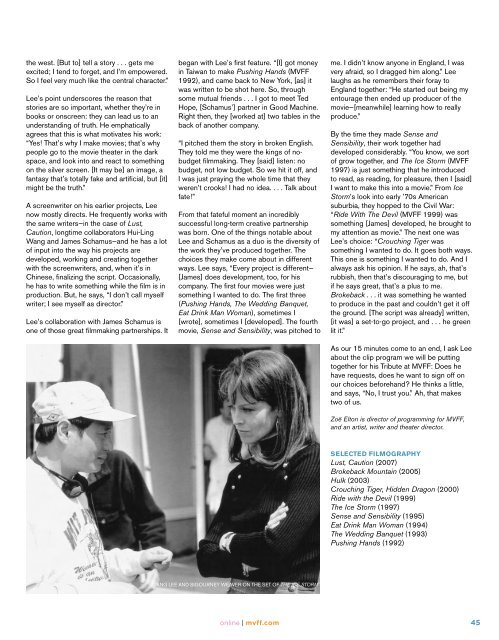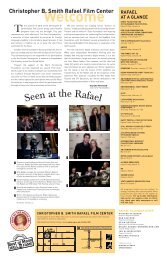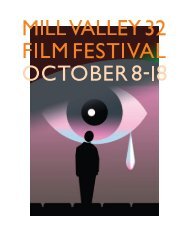ons stival . - California Film Institute
ons stival . - California Film Institute
ons stival . - California Film Institute
You also want an ePaper? Increase the reach of your titles
YUMPU automatically turns print PDFs into web optimized ePapers that Google loves.
the west. [but to] tell a story . . . gets me<br />
excited; I tend to forget, and I’m empowered.<br />
So I feel very much like the central character.”<br />
lee’s point underscores the reason that<br />
stories are so important, whether they’re in<br />
books or <strong>ons</strong>creen: they can lead us to an<br />
understanding of truth. He emphatically<br />
agrees that this is what motivates his work:<br />
“yes! That’s why I make movies; that’s why<br />
people go to the movie theater in the dark<br />
space, and look into and react to something<br />
on the silver screen. [It may be] an image, a<br />
fantasy that’s totally fake and artificial, but [it]<br />
might be the truth.”<br />
A screenwriter on his earlier projects, lee<br />
now mostly directs. He frequently works with<br />
the same writers—in the case of Lust,<br />
Caution, longtime collaborators Hui-ling<br />
Wang and James Schamus—and he has a lot<br />
of input into the way his projects are<br />
developed, working and creating together<br />
with the screenwriters, and, when it’s in<br />
Chinese, finalizing the script. Occasionally,<br />
he has to write something while the film is in<br />
production. but, he says, “I don’t call myself<br />
writer; I see myself as director.”<br />
lee’s collaboration with James Schamus is<br />
one of those great filmmaking partnerships. It<br />
began with lee’s first feature. “[I] got money<br />
in Taiwan to make Pushing Hands (MVFF<br />
1992), and came back to New york, [as] it<br />
was written to be shot here. So, through<br />
some mutual friends . . . I got to meet Ted<br />
Hope, [Schamus’] partner in Good Machine.<br />
right then, they [worked at] two tables in the<br />
back of another company.<br />
“I pitched them the story in broken english.<br />
They told me they were the kings of nobudget<br />
filmmaking. They [said] listen: no<br />
budget, not low budget. So we hit it off, and<br />
I was just praying the whole time that they<br />
weren’t crooks! I had no idea. . . . Talk about<br />
fate!”<br />
From that fateful moment an incredibly<br />
successful long-term creative partnership<br />
was born. One of the things notable about<br />
lee and Schamus as a duo is the diversity of<br />
the work they’ve produced together. The<br />
choices they make come about in different<br />
ways. lee says, “every project is different—<br />
[James] does development, too, for his<br />
company. The first four movies were just<br />
something I wanted to do. The first three<br />
(Pushing Hands, the Wedding Banquet,<br />
Eat Drink Man Woman), sometimes I<br />
[wrote], sometimes I [developed]. The fourth<br />
movie, sense and sensibility, was pitched to<br />
ANG lee ANd SIGOurNey WeAVer ON THe SeT OF tHE iCE storM<br />
online | mvff.com<br />
me. I didn’t know anyone in england, I was<br />
very afraid, so I dragged him along.” lee<br />
laughs as he remembers their foray to<br />
england together: “He started out being my<br />
entourage then ended up producer of the<br />
movie—[meanwhile] learning how to really<br />
produce.”<br />
by the time they made sense and<br />
sensibility, their work together had<br />
developed c<strong>ons</strong>iderably. “you know, we sort<br />
of grow together, and the ice storm (MVFF<br />
1997) is just something that he introduced<br />
to read, as reading, for pleasure, then I [said]<br />
I want to make this into a movie.” From ice<br />
storm’s look into early ’70s American<br />
suburbia, they hopped to the Civil War:<br />
“ride With the Devil (MVFF 1999) was<br />
something [James] developed, he brought to<br />
my attention as movie.” The next one was<br />
lee’s choice: “Crouching tiger was<br />
something I wanted to do. It goes both ways.<br />
This one is something I wanted to do. And I<br />
always ask his opinion. If he says, ah, that’s<br />
rubbish, then that’s discouraging to me, but<br />
if he says great, that’s a plus to me.<br />
Brokeback . . . it was something he wanted<br />
to produce in the past and couldn’t get it off<br />
the ground. [The script was already] written,<br />
[it was] a set-to-go project, and . . . he green<br />
lit it.”<br />
As our 15 minutes come to an end, I ask lee<br />
about the clip program we will be putting<br />
together for his Tribute at MVFF: does he<br />
have requests, does he want to sign off on<br />
our choices beforehand? He thinks a little,<br />
and says, “No, I trust you.” Ah, that makes<br />
two of us.<br />
Zoë Elton is director of programming for MVFF,<br />
and an artist, writer and theater director.<br />
seleCted FilMography<br />
Lust, Caution (2007)<br />
Brokeback Mountain (2005)<br />
Hulk (2003)<br />
Crouching tiger, Hidden Dragon (2000)<br />
ride with the Devil (1999)<br />
the ice storm (1997)<br />
sense and sensibility (1995)<br />
Eat Drink Man Woman (1994)<br />
the Wedding Banquet (1993)<br />
Pushing Hands (1992)<br />
45




